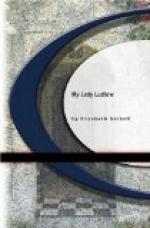Miss Galindo told my lady. Miss Galindo herself cried plentifully, but my lady, although very much distressed, could not cry. It seemed a physical impossibility, as if she had shed all the tears in her power. Moreover, I almost think her wonder was far greater that she herself lived than that Mr. Horner died. It was almost natural that so faithful a servant should break his heart, when the family he belonged to lost their stay, their heir, and their last hope.
Yes! Mr. Horner was a faithful servant. I do not think there are many so faithful now; but perhaps that is an old woman’s fancy of mine. When his will came to be examined, it was discovered that, soon after Harry Gregson’s accident, Mr. Horner had left the few thousands (three, I think,) of which he was possessed, in trust for Harry’s benefit, desiring his executors to see that the lad was well educated in certain things, for which Mr. Horner had thought that he had shown especial aptitude; and there was a kind of implied apology to my lady in one sentence where he stated that Harry’s lameness would prevent his being ever able to gain his living by the exercise of any mere bodily faculties, “as had been wished by a lady whose wishes” he, the testator, “was bound to regard.”
But there was a codicil in the will, dated since Lord Ludlow’s death—feebly written by Mr. Horner himself, as if in preparation only for some more formal manner of bequest: or, perhaps, only as a mere temporary arrangement till he could see a lawyer, and have a fresh will made. In this he revoked his previous bequest to Harry Gregson. He only left two hundred pounds to Mr Gray to be used, as that gentleman thought best, for Henry Gregson’s benefit. With this one exception, he bequeathed all the rest of his savings to my lady, with a hope that they might form a nest-egg, as it were, towards the paying off of the mortgage which had been such a grief to him during his life. I may not repeat all this in lawyer’s phrase; I heard it through Miss Galindo, and she might make mistakes. Though, indeed, she was very clear-headed, and soon earned the respect of Mr. Smithson, my lady’s lawyer from Warwick. Mr. Smithson knew Miss Galindo a little before, both personally and by reputation; but I don’t think he was prepared to find her installed as steward’s clerk, and, at first, he was inclined to treat her, in this capacity, with polite contempt. But Miss Galindo was both a lady and a spirited, sensible woman, and she could put aside her self-indulgence in eccentricity of speech and manner whenever she chose. Nay more; she was usually so talkative, that if she had not been amusing and warm-hearted, one might have thought her wearisome occasionally. But to meet Mr. Smithson she came out daily in her Sunday gown; she said no more than was required in answer to his questions; her books and papers were in thorough order, and methodically kept; her statements of matters-of-fact accurate, and to be relied on. She was amusingly conscious of her victory over his contempt of a woman-clerk and his preconceived opinion of her unpractical eccentricity.




